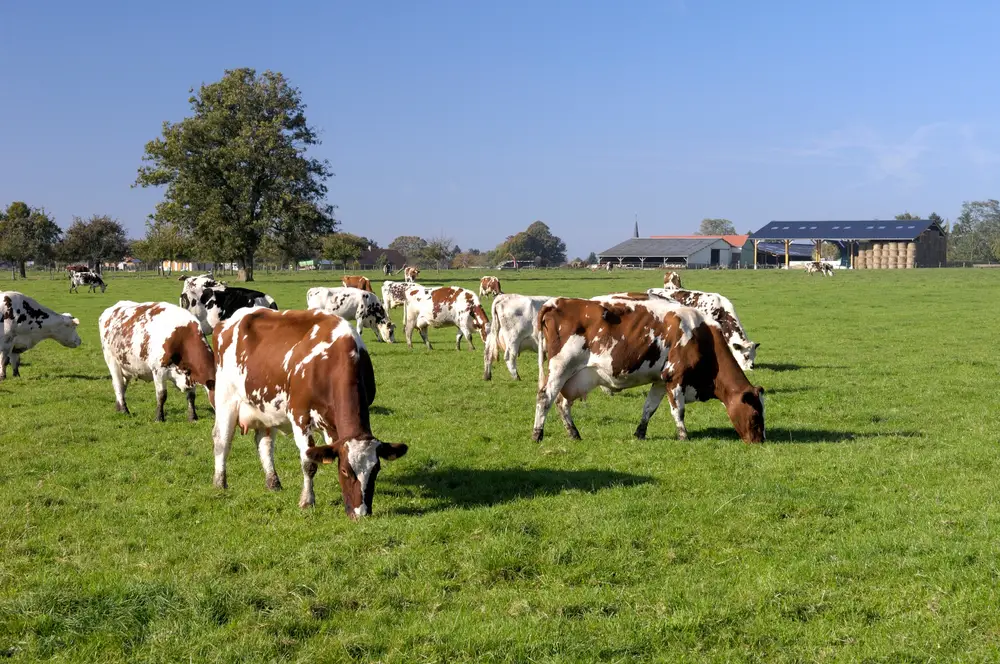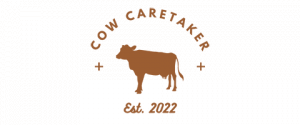Maine Anjou cattle are sturdy, attractive beef cattle originally from France. Their genetics are desirable globally for crossbreeding with other beef breeds for their multiple desirable traits and are a low-maintenance, highly profitable choice for small farms.
This article will cover the history of this noble breed, the characteristics that make them so special, and the many reasons why Maine Anjou cattle may be perfect for your farming operation.
Table of Contents
Where Does The Maine Anjou Come From?
Originally from northwestern France, the two breeds that created the Maine Anjou were muscular Mancelle cattle native to France, and Durham cattle that were brought from England by Count de Falloux in 1839.
Mancelle cattle are a dairy breed, while Durham cattle were known as a beef breed. The combination of the two produced a new type of cattle that was a dual-purpose breed.
Mancelle and Durham were successfully crossbred to produce the first Maine-Anjou, though they weren’t known by this name originally. After 11 years of selective breeding, Durham-Mancelle cattle were winning titles at agricultural fairs in France and gaining attention from overseas buyers.
The Society of Durham-Mancelle Breeders was founded in 1908 in the Mayenne district. A year later, they changed the name when they re-named the breed as Maine Anjou, after the Maine river and Anjou river valleys. The breed society was then known as the Society of Maine-Anjou Cattle Breeders.
Maine-Anjou semen has since been exported to many countries for artificial insemination of local cattle to such countries as the United States, Australia and New Zealand, beginning in 1969. Purebred live cattle followed suit, and Maine-Anjou blood has been mixed with several breeds around the world including Angus cattle, to strengthen them and add hybrid vigor.
The American Maine-Anjou Association was founded in 1969 and continues to promote the breed and offer 4H programs for youth interested in farming operations.
The Maine-Anjou Society is the Maine-Anjou breed association of Australia and they promote the commercial values of the breed, while trying to maintain the integrity of their herdbook, and promote breeding programs in their country and overseas.
Maine Anjou Cattle Breed Characteristics
| Official Breed Name | Maine Anjou or Rouge des Prés |
| Origin | France |
| Appearance | Maine Anjou cattle are dark red or black with white and are polled They have strong conformation with well-built, strong legs They have long faces and noses that are tilted upward Males are more muscular than females and have rounded appearances |
| Calf Weight | 90lbs at birth |
| Mature Cow Weight | 1500lbs to 1900lbs |
| Mature Bull Weight | 2200lbs to 3100lbs |
| Ready To Breed | 13 to 15 months |
| Gestation Period | 283 days |
| First Calvings | 2 years |
| Time to Slaughter | 30 months |
| Carcass Weight | 837lbs |
| Expected Lifespan | 15+ years and productive for approximately 10 years |
| Known For | Beef production Feed efficiency Excellent carcass characteristics Docile temperament Dual-purpose breed Milk production High weaning weights Calving ease |
| Climate | Excels in all climates |

What Is So Special About Maine Anjou Cattle?
Maine Anjou cattle have excellent genetics and conformation, making them ideal breeders. Many countries worldwide import Maine-Anjou semen for artificial insemination programs to strengthen their local cattle.
Maine Anjou are perfect for small farmers as a dual-purpose animal, capable of providing excellent milk and meat. They are likewise great for beginners because of their docility, ease of handling, and low maintenance requirements.
Maine Anjou are known for feed efficiency and producing high-quality carcasses that are profitable. Though they are slow to mature, the performance and yield obtained make up for the extra maturation time.
The muscling is pronounced in the best places and they have an optimized amount of fat that is evenly distributed throughout the meat. The meat is tender, flavorful, and is a favorite among other popular beef breeds.
Why Should I Raise Maine Anjou Cattle On My Farm?
- Heifers have an easy time calving and are highly fertile
- Cows are heavy milking and have strong maternal instincts
- Place highly in carcass evaluation tests
- Maine Anjou steers win competitions regularly
- Popular in youth programs
- Low maintenance and cost-efficient breed
- Known for their hardiness and disease resistance
- An adaptable breed that can be raised in any climate
- Rapid growth and weight gain with excellent feed efficiency
- Well-marbled muscle with minimum fat
- Produce a large rib-eye area
- Can be crossbred with British breeds successfully
- Known in America and Australia for competition in cattle shows
